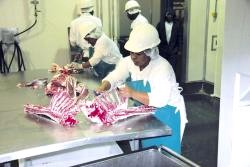the result could be devestating to Africa's newly growing tourist industry.
And then it gets worse.
...other African success stories are threatened by this new "stay local" trend. During the last decade, African agricultural products are increasingly admitted into the protectionist European market, even when also produced in Europe. This includes beef from Namibia and Botswana, fresh flowers, fruit and vegetables from Kenya and even processed food products from South Africa and Ghana.
None of the few African countries that have managed to enter European markets with agricultural products that compete with local producers have had an easy path reaching their position. Food quality and hygiene standards in Europe are extremely rigid and to a large degree designed to exclude foreign competition. To be able to reach sceptical European consumers, African producers mostly also have been obliged to follow strict environmental and social guidelines.
Also, African food products for years had to fight against false prototypes promoted by seemingly well-meaning anti-globalisation activists that to a great degree were funded by local farmer organisations. Development specialists - who do not get much air-time in European media - had to explain on and on again that European consumers were not "stealing food from starving Africans" when buying their products, but that these imports indeed would promote wealth and empowerment in rural Africa.
But in country after country, also these hard-bought gains are now under attack. Britain is the country where consumers so far have had the strongest focus on how far the food basket has travelled before reaching supermarkets. "Fresh vegetables from Africa" have for several years been one of the main focuses of environmental and anti-globalisation activists. They have even produced research claiming that the further foods have travelled, "the more their vitamin and mineral content deteriorates."
Already in 2003, airlifted baby carrots and garden peas from South Africa were highlighted in energy budgets of imported foods. For carrots, "it will have taken 68 calories of energy in the form of fuel to air freight each calorie of carrot energy," while "fresh peas require approximately two and half times the energy to produce, package and distribute as those sourced locally," the British daily 'Guardian' reported. South African wine, which is mostly shipped, however was praised for its "tiny" CO2 emissions. Of all the African products scrutinised, only wine is not produced Britain.
Years of campaigning against African agricultural products in the UK - whose funding has yet to be revealed - has already left its mark on British consumers. The easy-selling "fact" that locally produced vegetables, meat, flowers and fruits are more environmentally fit than African imports has made many consumers look for "low emission products".
That this trend is significant was demonstrated by a surprise marketing campaign by Britain's largest supermarket chain, Tesco, in February 2007. The retailer was to introduce "carbon counting" labelling to let
 |
High quality lamb processed for the Norwegian market in Mariental, Namibia: |
| © Ulvar Arnkværn/Norwatch/afrol News |
Tesco is one of the main channels for Kenyan products to European consumers - indeed half of Kenya's agricultural exports go to Britain. Naturally, the surprise marketing stunt caused frustrations at the Fresh Produce Exporters Association of Kenya (FPEAK), which had not been consulted on the move. While Tesco promised to keep on importing Kenyan products, "carbon counting" labels on these goods from 2008 will tell a one-sided story to British consumers. ...


No comments:
Post a Comment